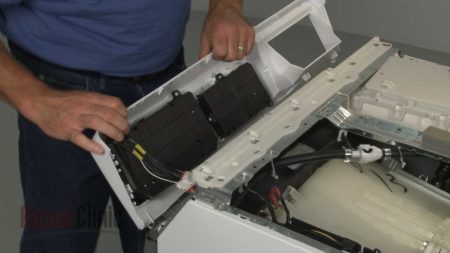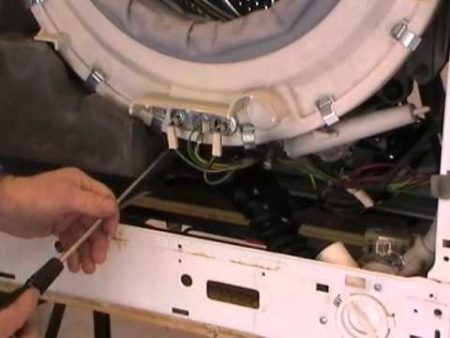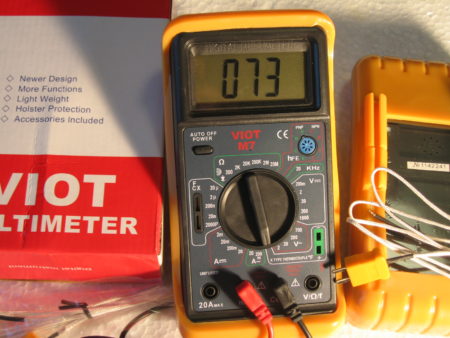A washing machine is a sophisticated household appliance capable of supporting several washing modes for different types of laundry at once. One of its main features is the rapid heating of water for washing with a heating element. Temperature control is carried out thanks to built-in sensors. If the water is too cold or hot, then you will need to check the temperature sensor in the washing machine and possibly replace it with a new one.
Main temperature sensors in the washing machine
The automatic clipper can be equipped with various types of monitoring sensors. Usually there are several varieties:
- thermistors;
- bimetallic;
- gas-filled.
As you might guess, they differ in design features and principles of work. Diagnostics of malfunctions and further repairs may depend on this. But first you need to determine the presence of a breakdown.
This is usually quite difficult to do, because the water is inside and it is not clear what the temperature is there. One of the signs is that there is a lot of steam. This means that the contents are practically boiling inside. You can also reveal the opposite effect - if the water is drained cold, then the machine practically does not heat anything.
![]() See also - Do-it-yourself troubleshooting of a washing machine tank
See also - Do-it-yourself troubleshooting of a washing machine tank
How to check the temperature sensor in the washing machine?
Usually, with simple washing modes, heating up to 30 ° C is required. In some cases, malfunctions lead to the fact that the sensor does not send a signal to stop the heating element, so the machine continues to heat the water up to the maximum possible temperature. In such cases, repairs are necessary because this can damage the laundry or lead to high energy costs.

A malfunction may lie not only in the temperature sensor, but also in a special programmer responsible for automatic control. The features of the check depend on the specific variety.
Malfunctions of bimetallic sensors are usually associated with mechanical damage or wear, as a result of which the electrical circuit does not open. As a result, the water is brought to the critical boiling point. To check the status, you need to do the following:
- partially disassemble the body of the washing machine;
- remove the terminals of the wires from the temperature sensor;
- use a multimeter on the contacts when selecting different modes.
The resistance should be the same, but in case of faults it will differ under different conditions.
The gas-filled thermostat is larger than the bimetallic one and includes a copper capillary tube. Usually the malfunction is associated with damage to this tube with freon. If the gas evaporates, then the temperature is determined incorrectly. The following procedures are carried out for verification:
- partially disassemble the car body to get to the sensor;
- use a multimeter to measure the resistance between the terminals;
- listen if there is a characteristic click when the contacts open when the heating element stops heating.
Washing machine thermal sensors are usually located at the bottom of the tank. Care must be taken not to damage the copper pipe during repairs.

Modern washing machine models are equipped with electronic thermistors. They measure resistance using semiconductors. The specific temperature of the water inside the tank depends on the resistance. In addition to this, there is a special controller responsible for the operation of the heating element. Such varieties are considered the most effective, but repairs in this case are more difficult. Usually, only replacing the temperature sensor can save.
Such sensors are plastic or metal rods that are attached directly to the heating element block. Their working part is immersed in water to determine the temperature.
What is the resistance of the washing machine temperature sensor?
Depending on the specific model of the machine and the type of sensor used, the resistance will be different. For Zanussi, Electrolux, AEG models at a temperature of 30 ° C, the indicators will be 17-17.5 kΩ, and at 80 ° C - about 2.1-2.5 kΩ. Generally, the higher the temperature, the lower the resistance.

The Candy models have 27.0 kΩ in normal modes. Ardo machines have about 5.8 kΩ. Ariston has 20.0 kΩ. The resistance of Samsung sensors at room temperature is 12 kΩ.
However, this information is not 100% accurate and therefore cannot be used as a basis for immediate repair. It is necessary to accurately establish the characteristics for a specific model and only then carry out a replacement or try to eliminate malfunctions. Details can be found in the machine descriptions or on the home appliance manufacturer's website.
If you take up the repair of the washing machine, you will need to carefully check everything and prepare the tools. However, it is always best to consult a specialist about a specific model.
See also:
- 7 best Indesit washing machines according to customer reviews
- 7 best LG washing machines
- 7 best Gorenje washing machines according to customer reviews
- 7 best washing machines under 20,000 rubles according to customer reviews
- 8 best narrow washing machines according to buyers' opinion

